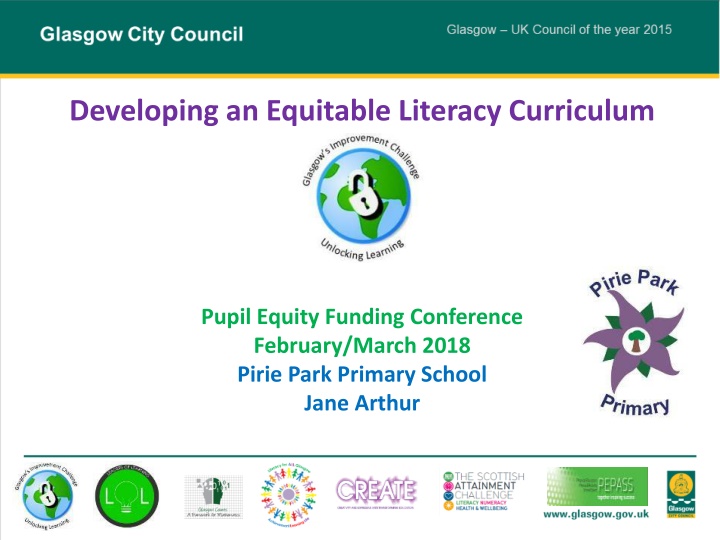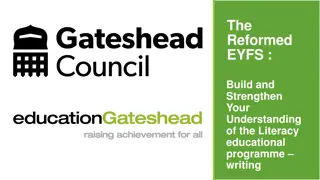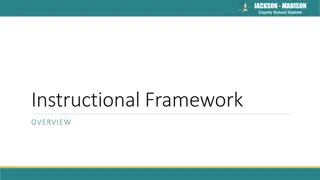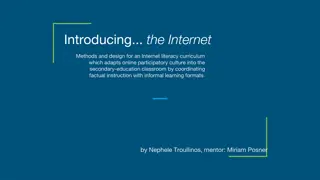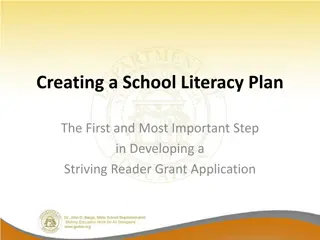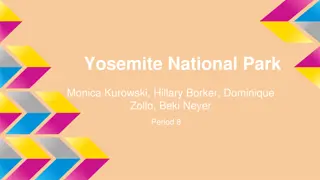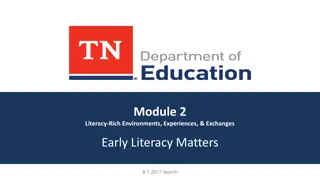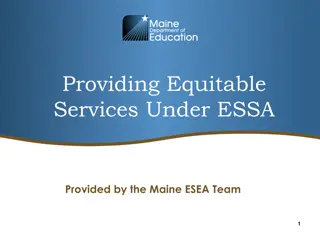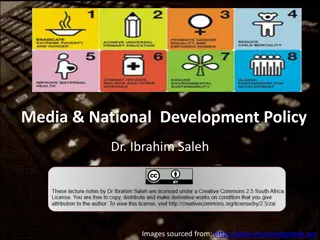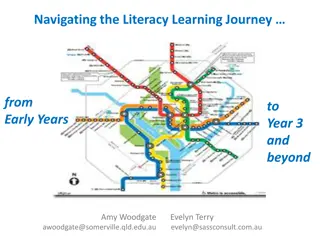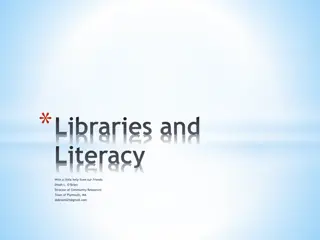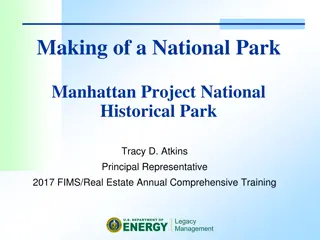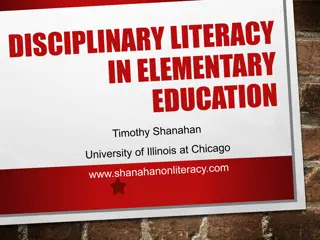Equitable Literacy Curriculum Development at Pirie Park Primary School
"Pirie Park Primary School in Govan, Glasgow, focuses on creating an inclusive and nurturing environment for students, staff, and parents. Through their vision and aims, they aim to foster successful learners, confident individuals, responsible citizens, and effective contributors. The school provides various facilities and opportunities for students to excel and reach their full potential. With a diverse student body and strong community partnerships, Pirie Park Primary School is dedicated to promoting learning, respect, kindness, and friendship among all stakeholders."
Download Presentation

Please find below an Image/Link to download the presentation.
The content on the website is provided AS IS for your information and personal use only. It may not be sold, licensed, or shared on other websites without obtaining consent from the author.If you encounter any issues during the download, it is possible that the publisher has removed the file from their server.
You are allowed to download the files provided on this website for personal or commercial use, subject to the condition that they are used lawfully. All files are the property of their respective owners.
The content on the website is provided AS IS for your information and personal use only. It may not be sold, licensed, or shared on other websites without obtaining consent from the author.
E N D
Presentation Transcript
Developing an Equitable Literacy Curriculum Pupil Equity Funding Conference February/March 2018 Pirie Park Primary School Jane Arthur
We value: Respect Learning Kindness Friendship Trust
Pirie Park Primary School Our VISION: To create a safe, happy, caring and inclusive school where children, staff and parents feel valued, show respect, have fun and actively work together to be the best they can be through the following aims: Our AIMS: To produce SUCCESSFUL LEARNERS by raising the standard and quality of learning and teaching, achievement and attainment in Literacy, Numeracy and Health and Well Being. To develop and nurture resilient and CONFIDENT INDIVIDUALSequipped for life s choices and challenges. To provide equal opportunities for RESPONSIBLE CITIZENS to reach their full potential within a climate of mutual respect, whilst promoting a positive community ethos. To encourage EFFECTIVE CONTRIBUTORS to be enterprising, learn various skills including problem solving and work collaboratively in order to become valued members of society.
Our school context Pirie Park Primary is a non-denominational, co-educational school situated in the Govan area, in the South of Glasgow. New, purpose built school within the Pre-12 strategy for Glasgow City Council, which aims to raise the quality of educational provision for children in Glasgow. The school opened in January 2010 and is an amalgamation of Drumoyne, Elderpark and Greenfield Primary Schools within Govan. Two storey building which consists of fourteen classrooms, two General Purpose rooms-currently used as classrooms, a Nurture Room, a play therapy room, a library/ICT suite, a full size sports hall and a dining/assembly hall. Outdoor facilities include the playground, a trim-trail, an outdoor classroom, an orchard, a wildlife garden and an outdoor, all-weather 2G football pitch. We share our premises with Govan Family Learning Centre (0-5years) and Glasgow Life Facility; Glasgow Club Drumoyne; this facility includes a Fitness Suite and Fitness/Dance Studio.
Our school context continued Currently: 16 classes with an average roll of 440 children. Approximately 44% of our pupils entitled to free school meals. 14% of pupils have English as an Additional Language. A number of children on the school roll are placing requests. 89.7% of our children live in SIMD 1 &2. Teaching compliment is 24FTE teachers; this includes our Nurture Group teacher and 1.6FTE Challenge Leaders of Learning 1 CDO, 12 Support for Learning Workers and 3 clerical admin staff. 1.5FTE EAL to support bilingual children; we currently have 23 different languages. Govan/Bellahouston Learning Community associated secondary school is Govan High School. Share Campus with Govan Family Learning Centre and Glasgow Club Drumoyne. Parent Council is very supportive of the school and effective in its role. Partnership with Govan Home Education Link Project, Govan HELP to support our children and their families. Throughout 2015-2020 we are in Cluster 10 with 5 other schools as part of Glasgow s Improvement Challenge; benefit from 1.6FTE additional staffing to support Raising Attainment. 2017/2018 PEF funded staff include; PT Raising Attainment, Class Teacher, CDO and SFLW
% Level of Staged Intervention Staged Intervention Level 1 2 3 4 Whole School 3=0.7% 99=22.5% 13=3% 26=5.9% GIC group 2015/2016-P2 2016/2017-P3 2017/2018-P4 (72 children) % - 25=34.7% 5.7% 1=1.4% 0.2% 6=8.3% 1.4% 2015/2016-P2 Focus on Phonological Awareness 2016/2017-P3* Focus on Reading Comprehension *Partnership with GDSS-Inclusion School 2017/2018-P4 Continued Focus on Reading and Reading Comprehension
Overview of CfE attainment with reference to GIMD comparators School Predictions (April 2017) % P1 Early Level 92 Reading Writing % 93 T and L % 98 Numeracy % 96 P4 First Level P7 Second Level Overall 91 78 87 91 79 87 98 79 91 82 73 83 Actual Reading % Writing % T and L % Numeracy % 2015/2016 83 78 84 82 2016/2017 86 86 92 82 Difference +3 +8 +8 = Making very good progress overall in Literacy; Literacy has been the focus of Glasgow s Improvement Challenge Numeracy is not as strong as Literacy and no gains made; focus on Numeracy via PEF 2017/2018 SIMD 1&2 and non-attendance impacts on attainment; focus on these areas via PEF 2017/2018 There is a dip in attainment at second level across all areas Pirie Park has the highest Writing (86%) & Reading (86%) attainment amongst comparator schools Pirie Park has the second highest Numeracy (82%) and T and L (92%) attainment amongst comparator schools
What processes and procedures inform your CfE levels? *Quality Assurance Calendar *Class Profiles *Learning Conversations: -children v staff -staff v SLT -SLT v children (triangulation) *Use of the Primary Tracking Database (termly time for this included in WTA) *Assessment & Moderation: -Stage Planning/Meetings -Department Meetings -Learning Community *Familiarisation with Benchmarks
Cluster 10 Schools Pirie Park Primary Riverside Primary Ibrox Primary Lorne Street Primary Pollokshields Primary* Glendale Primary Glendale Gaelic ; Bunsgoil Ghaidhlig Gleann Dail* Initially matched by SIMD for Glasgow s Improvement Challenge& then PEF*
Identifying the gap looking INWARD: Attainment Challenge 2015-2020 Glasgow s Improvement Challenge Cluster 10 Schools; Pirie Park, Riverside, Ibrox, Lorne Street, Pollokshields*, Glendale and Glendale Gaelic Challenge Leaders of Learning and Senior Leadership Teams; collaboration across all cluster schools Literacy was agreed as the area for focus
Raising Attainment in Literacy Plan Cluster Plan: Year 1 (2015/2016) Target Focus Group, Primary 2-Phonological Awareness -arose from Glasgow Dyslexic Support Service GDSS Phonological Awareness Assessment Results; identified as a common concern across Cluster Schools Year 2 (2016/2017) Target Focus Group, Primary 3-Reading Comprehension -PM Benchmarking Assessment Results + LEGACY previous year (P2) -Reading Strategies CLPL for ALL teachers across all Cluster Schools +PUPIL EQUITY FUNDING introduced from April 2017 Year 3 (2017/2018) Target Focus Group, Primary 4-Reading Strategies and Reading Comprehension -NFER Reading Assessment Results -previous PM Benchmarking Results + LEGACY previous year (P3) +PUPIL EQUITY FUNDING 2017/2018
What were we going to do about it LOOKING OUTWARD: Reader Engagement, Reading Comprehension and Attainment in Literacy; specifically Reading [Commercial Reading programme], University College London UCL Professor Sue Ellis, Strathclyde University Evidence schools involved in Renfrewshire Council Challenge Leaders of Learning own research and reading Collaboration with Cluster Schools Senior Leadership Teams Planning a model appropriate for Cluster Schools Shared/jointly funded by PEF Developing an Equitable Literacy Curriculum Partnership Strathclyde University and schools within Cluster 10
Aims The aim of this Pupil Equity Funded project was twofold: To raise attainment and narrow the poverty related attainment gaps associated with different groups by ensuring that literacy teaching is effective, efficient and accessible for all, making it more responsive to, and supportive of, pupils experiences in and out of school. To help school staff further develop a whole-school ethos about literacy teaching that is shaped by the children, families and communities the schools serves, making it distinct, creative, emotionally grounded and intellectually interesting.
Outcomes The educational outcomes are to: Broaden and deepen teachers literacy teaching knowledge, skills and confidence, resulting in a wider range of pedagogies, more flexible and responsive teaching and a shared and creative vision of the school-wide literacy-rich curriculum. Increase pupil attainment, with particular emphasis on pupils from disadvantaged backgrounds showing increased knowledge/skills, engagement, quantity and quality of their response to texts in reading/writing. Sustainable and effective approaches to record-keeping and diagnostic teaching.
CLPL for Teachers CLPL from Professor Sue Ellis and Jenny Carey, Strathclyde University for ALL teachers across Cluster Schools 3 DOMAINS -Cognitive -Cultural Capital -Social Identity CLPL delivered as 4 X 2 hour twilights (within WTA) twice weekly on Mondays and Wednesdays (hosted in Pirie Park and Glendale) in order to accommodate all including job share teachers.
The Coaching Model The 3 cueing systems/ways to work out words:
Teach good strategies Good coaching; acknowledge then prompt
Ensure book is at the right level Ask and think about how children are reading
Cultural Capital this can directly impact on comprehension teaching:
Learner motivation and identity Learner identity is complex and always shifting. It is affected by constructs around the following: Gender Race Class Social context
Classroom Practice Impact of the social context Nature of reading opportunities offered Activities and texts Social spaces and networks around reading/writing How are these promoted How individuals participate in and feel about them How a learner is positioned by teachers and other learners
Reading engagement comes from A coherent curriculum Interesting texts Meaningful and purposeful tasks Social collaboration Intrinsic motivation Strategy teaching (teaching that travels)
Principles that matter Fostering self-efficacy, challenge and enjoyment Self organisation; time, materials, ideas Choice Attending to what the reader/writer is saying Being confident enough to let the children make mistakes and using these to inform teaching Building understanding of the reader/writer gap and using this to drive the writers craft issues Asking parents to do what they are good at; celebrate their children s efforts and remind them about all the other stuff Serious assessment of achievement AND attainment; focussing on writers and writing.
Reading Sessions/Clinics Snap-shot of the child s reading and attitude to reading and mind-set at the start of the reading session. Progress made and what does that progress look like? Significant moments that promote agency, comprehension, knowledge and engagement. How the child used their experiences and funds of knowledge from outside school, and responds in terms of likes/dislikes, puzzles and connections? Impact of this on their identity, agency, engagement and comprehension? Barriers to improvement; what limits the capacity to be responsive; teacher knowledge, planning, resource availability
Reading sessions/clinics Pirie Park Primary; 33 teachers involved 7 teams of 4 and 1 team of 5 (SLT) Each team allocated an identified child (Primary 4) Each teacher hosts a reading session with their child once a week Reading clinic/professional dialogue between the team of teachers takes place after readings sessions have taken place DAY Monday Tuesday Wednesday Thursday Friday Child 1 Teacher 1 Reading Session 30mins Teacher 2 Reading Session 30mins Teacher 3 Reading Session 30mins Teacher 4 Reading Session 30mins Reading Clinic Professional Dialogue (Teachers 1-4)
Reading sessions/clinics Organised by Challenge Leaders of Learning during Term 2 Organisation was crucial to success and included: Who? When? Where? consideration given to NCCT timetables, job share teachers, children s activities/timetables, appropriate space available and Sue Ellis and Jenny Carey s visits.
Meanwhile P2-Phonological Awareness P3-Read and Respond/Reading Strategies P4-Getting Started with Reading and Reading Strategies P5-7 Reading into Writing Strategies Library visits; all classes/all children joined library + parents Author visits; P2, P3 and P4 + parents Book Bug CLPL for P1 and P2 teachers and SFLWs Book Bug Sessions + P1 parents Literacy visits/outings + parents Lending library + parents Book bags + parents Book Assemblies First Minister s Reading Challenge Film Club Comic Caf Scotland Reads + parents Adult Learning and engagement + parents Resources
Looking FORWARD What have we done? CLPL for all teachers within Cluster Schools; 3 domains Reading Sessions with identified children Reading Clinics with teams of teachers Reading questionnaires with children On-going interventions/strategies to challenge the inequity in children s experiences and opportunities to be exposed to books, literacy and literacy related activities. Take account of what children bring with them; their own Funds of Knowledge and Social Identity
Looking FORWARD What have we achieved? Greater consistency, across all classes/cluster schools, in the effective teaching of reading and reading strategies, in cluster schools. Updated resources available to children in class/school libraries; on-going Addressing inequity by ensuring we take account of the 3 domains; cognitive, cultural capital and social identity of the children in our schools.
Looking Forward How do we know? Results from Literacy Project Questionnaire (113 teacher responses) Learning Visits to classes Peer Observation Learning Leading to Improvement-POLLI Changes to learning environments; class libraries, school libraries Film Club, Comic Caf attendance increased Reading questionnaire results; are children reading more? Running Records; used to help establish appropriate text levels for children Standardised assessments; PM Benchmarking, NFER SNSA (March-June 2018) CfE Levels (June 2018)
Teachers evaluations/responses A total of 113 teachers completed the questionnaire across the seven primary schools in the cluster. Teachers of all stages, members of the SMT and ChLOLs were represented in the sample. A majority of respondents had been teaching for 8 or more years (65%), while 15% were newly qualified (1-2 years) and 20% had been teaching for 3 to 7 years. Number Percent P1 P2 P3 P4 P5 P6 P7 All (e.g. McCrone cover) All (e.g. Learning Support) Senior Management Team ChLOL Total 16 12 13 13 15 12 12.0 9.0 9.8 9.8 11.3 9.0 6.8 5.3 9.0 12.8 5.3 100 Schools Number Percent Riverside 17 15.0 Glendale 18 15.9 Glendale Gaelic Number Percent 8 7.1 1-2 years 17 15.0 9 7 3-7 years Ibrox 23 20.4 16 14.2 Pollockshields 12 17 8 + years 18 15.9 73 64.6 Pirie Park 29 25.7 Total 113 100.0 7 Lorne Street 7 6.2 133* Total 113 100.0
Understanding of the 3 domains Cognitive Identity Cultural Capital Number Percent Number Percent Number Percent Greatly improved 25 22.1 54 47.8 56 49.6 Somewhat improved 62 54.9 46 40.7 42 37.2 No change 26 23.0 13 11.5 15 13.3 Total 113 100.0 113 100.0 113 100.0
A greater focus on comprehension and making sense of text, as opposed to the mechanics of reading. A number of responses mentioned using the 3 sharings to aid comprehension and discussion: I have considered the approaches used to teach reading, the main change is to no longer take for granted that children comprehend what is being read to them or by them. Children are taught to read but the focus needs to be stronger on understanding what they are reading and the meaning behind the text not simply ""barking at text"" I have come to realise that sometimes we get too bogged down by the decoding side of reading and perhaps don't put enough emphasis on the importance of comprehension, which can in turn, help with the pace/flow of reading. I have found the 'Three Sharings' to be useful as a way of prompting discussion about the text and the children have enjoyed talking about them.
A greater focus on getting the text level right. I now have a clearer understanding of how to assess a child to find their appropriate text level and feel much more confident that my children are reading at the correct level. I have a better awareness of the level of text the child should be reading - one which challenges yet is accessible for the child. Getting the right text level - Would have previously selected texts where accuracy was lower.
Greater use of running records and miscues to diagnose difficulties and inform coaching. I have a clear understanding of not only using Running Records but how to analyse the information gathered for use in next steps Running records provide much better understanding of reader s skills. I have developed in my understanding of how to use running records and other diagnostic tools to identify next steps for learning and plan targeted responsive teaching. I think much more about why miscues are happening and what next steps should be. I can analysis miscues that the children make and can then teach the appropriate strategy for that child.
A greater focus on the use of various reading strategies and on reading as problem solving. I am now more aware of strategies/tools to encourage learners to think about and make sense of text. Less reliance placed on the importance of phonics and using a wider range of strategies to coach. I feel that I have a better understanding of the different methods I can use to support readers e.g. through discussing semantics, way of decoding of words, phonics, syntax.
Greater understanding of the cognitive as one of 3 domains involved in teaching literacy and changes to promote a better balance between the domains by drawing on identity and cultural capital. A lot of teaching and learning has been focused on the cognitive domain. I believe this is evident in the way the children achieved appropriate scores in the miscue analysis but showed little depth of knowledge or were able to use their inference skills. It is not just the ability to decode that is important. As a result of this professional learning, I have an understanding the focus of most reading teaching in schools is on the cognitive domain. Recognition of this has made me consider how to develop the identity and cultural domains and that underpin the cognitive skills. We do quite a lot of work in this domain - what about the others? At my school there has always been a very clear and strong emphasis on teaching the cognitive skills so I feel that I have always had an explicit awareness of them and have developed confidence in this domain. If anything has changed it has been my understanding of the balance of this domain within my overall teaching of Literacy. I am now feeling far more confident in giving equal weight to the other domains as well.
Improved self-confidence in teachers ability to teach reading. Feel more confident in using these strategies to help poorer readers Feel more confident in identifying the children's text level, using cues and strategies etc. Improved understanding and greater awareness of the complexities of the reading process. I now understand more about the mechanics of reading. I'm now thinking about thinking when it comes to how children read. A wider understanding of how the mental process of reading is developed, what we use in the process of decoding & understanding the text that is being read. Changing practice to increase time on task. Allowing the opportunity for children to read as much as possible e.g. all children reading aloud to together to maximise reading time in class" Need to increase amount read each day per child.
Changes to how resources are used (e.g. book banding and more flexible use of reading schemes). This inspired me to re-evaluate the children were going through reading books and I let pupils choose their own reading books rather than having them follow the scheme for a trial period. This helped children engage with reading and improved their confidence as they were allowed to pick books that were more challenging than what they were previously reading. Also, we have bought lots of banded real books in the hope of supporting children to read for fun at the right level, which will support their understanding and their cultural capital.
Nature of change No response Very useful Moderately useful Slightly useful Not at all useful Total LC team discussions 5 73 26 9 113 Number 4.4 64.6 23.0 8.0 100.0 Percent Trying ideas with LC child 5 53 33 21 1 113 Frequency 4.4 46.9 29.2 18.6 .9 100.0 Percent Trying ideas with children 13 56 31 13 113 Frequency 11.5 49.6 27.4 11.5 100.0 Percent Talking with the Literacy ChLOL 45 28 14 1 113 25 Frequency 22.1 39.8 24.8 12.4 .9 100.0 Percent Talking with SMT 37 40 16 2 113 18 Frequency 100.0 15.9 32.7 35.4 14.2 1.8 Percent Talking with Strathclyde Mentor 9 44 39 20 1 113 Frequency 100.0 8.0 38.9 34.5 17.7 0.9 Percent Writing up/reading notes in LC file 33 42 24 8 113 6 Frequency 100.0 5.3 29.2 37.2 21.2 7.1 Percent Informal talk with colleagues 8 72 24 9 113 Frequency 100.0 7.1 63.7 21.2 8.0 Percent
Impact on children involved CHILD Improvement May17-Feb18 (NFER) Previous Gap May2017 Current Gap Feb 2018 Difference 1 1year 7months 1year9months 10months Closed 11months 2 1year 8months 1year7months 8months Closed 10months 3 1year 4months 1year 2months 7months Closed by 5 months 4 10months 10months 9months Closed 1 month 5 9months 1year 1year No change yet 6 1year 10months 7months Closed 3months 7 9months 10months 10months No change yet 8 5months 6months 10months Increase 4months
Childrens reading questionnaire results 100 95 80 90 CHILD A 60 CHILD B 85 40 80 20 75 0 70 1 2 3 1 2 3 100 100 80 80 CHILD D CHILD C 60 60 40 40 20 20 0 0 1 2 3 1 2 3 Before (BLUE) and After (RED) results 1 = % overall score 2 = % self concept 3 = % value of reading
What next We've spent extravagantly on banded real books and are about to launch them with each class. Teacher conversations support children to choose and enjoy books appropriate to their ability and own interests. We're looking for the 3 domains in the differentiated teaching of reading; in a less cognitive heavy way. We've organised parents reading workshops to work with their own child, gave them a version of the 3 sharing s and in a choice of 3 languages. Made a video of staff from P1 - P7 working with children in the 3 domains, both for parents and as a staff resource.
Implications for Classroom Practice % More Aware 90 80 70 60 Percentage 50 40 30 20 10 0
Implications for Classroom Practice % Tried it 100 90 80 70 Percentage 60 50 40 30 20 10 0
Likely to respond to child/notice % More likely to respond/notice 90 80 70 60 50 40 30 20 10 0
Priority areas to trial with children Teachers' priorities for literacy teaching 35 30 25 Number of teachers 20 15 10 5 0
